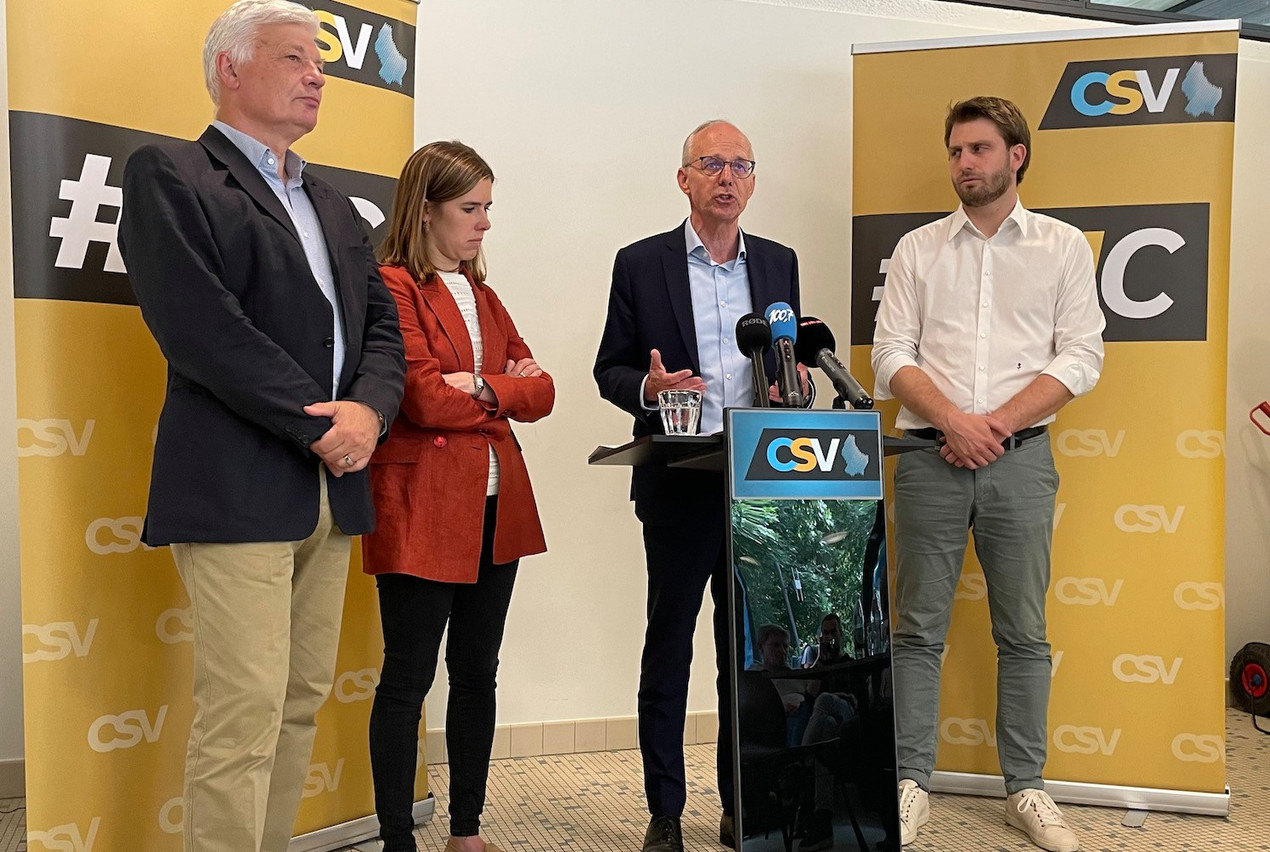, the party’s candidate for prime minister, was joined by co-presidents and and the head of the party’s youth branch, the CSJ, Alex Donnersbach to outline the CSV’s top ten priorities for the upcoming national elections.
“We need a better life. That means more purchasing power, pragmatic climate protection, and an economy that urgently creates jobs,” Frieden said. The party’s full election programme was adopted unanimously over the weekend, the former finance and justice minister said. But the full text remains to be edited and published.
The party at a congress on 8 July will present its full line-up of candidates running for office. In the meantime, there are some of the key points the party wants to campaign on.
- To increase purchasing power, the CSV wants to reduce taxes “for everyone,” Frieden said. Income should be tax-free to a higher amount and progression in the tax brackets should be slower.
Currently, single parents move from tax bracket 2 for married couples to 1a for single parents after three years. The CSV wants to extend this period to six years. Frieden said the party “categorically” opposes a wealth or inheritance tax.
- Moving from work-life balance to work-kids balance will be a measure to support young families. That includes the right to take four hours of unpaid family leave per week, effectively reducing working hours to 36 for parents of primary school-age children, although at a cost for the employee.
Elsewhere, the party wants to pay double the child allowance for families with a stay-at-home parents.
- The private sector should get more access to the affordable housing market, Frieden said. “A lot has to change.” The environment ministry should have no say on measures slowing down building within the construction perimeter, he said.
Higher and more dense building must become possible and VAT on construction for investors should go back down from 17% to 3% after the DP-LSAP-déi Gréng coalition had raised this almost ten years ago.
- Also in healthcare there should be more access for the private sector, Frieden said. This would allow more ambulatory care and de-centralised diagnostics and treatment options, reducing waiting times. “Not everything needs to emanate from the hospitals,” he said.
LSAP health minister (LSAP) is pushing for an approach whereby hospitals keep the oversight of diagnostics technology, such as MRI scanners, being operated outside of hospital infrastructure.
In these four areas, Frieden said the party if voted into office would aim to make quick and efficient progress.
The remaining six priorities--in no particular order--as presented on Monday are:
- Recruitment of 700 police officers over five years and increasing CCTV surveillance to improve security.
- “Fundamentally reforming” language teaching in the Luxembourg education system and giving pupils more opportunity to develop between academic and vocational branches.
- A competitive economy with less red-tape, support for the digital and green transition, tax incentives for start-up investment and improving the status of independents. “Without an economy that works, that grows, everything else isn’t possible,” Frieden said.
- Climate protection and substantial growth in renewable energies, fast-track procedures for solar, wind or other renewables projects, streamlined administrative procedures and pragmatic policy. “If we want cycling paths, we must perhaps compromise on environmental protection.”
- Transport must improve for Luxembourg to remain attractive, Frieden said. The current situation is “absolutely not satisfactory.” Among the CSV’s plans are bypass roads in communes with a lot of through-traffic as well as expanding the tram to the capital’s periphery, such as Strassen, Sandweiler or Niederanven.
- Digitalisation of public services, looking to Estonia as a model for a “modern Luxembourg.”
“Without healthy public finances, you cannot do a lot,” Frieden said, adding that more business activity and growth would help generate more disposable income, household spending and state revenue, even if a tax reform would reduce what goes into state coffers.
Delano’s sister publication Paperjam is sitting down with a more in-depth interview with Frieden on 20 June.
This article was updated on 19 June at 5.50pm to specify that the four weekly hours of family leave would be unpaid.
